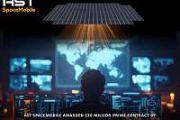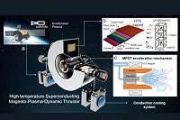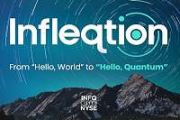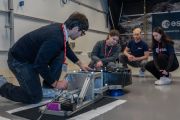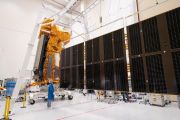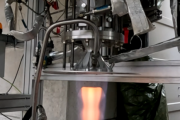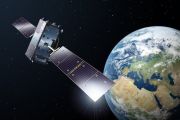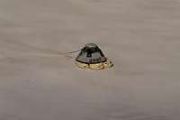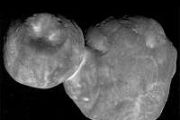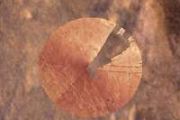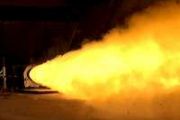
Copernical Team
Experiments show algae can survive in Mars-like environment
 Chinese researchers have demonstrated that algae can survive in a Mars-like environment during four experiments since 2019, raising the hope that mankind might be able to turn the barren planet into an earth-like green one in the future.
In a seven-hour experiment which took place in September this year, algae were carried by a helium balloon to an altitude of 30,000 meters and survived fo
Chinese researchers have demonstrated that algae can survive in a Mars-like environment during four experiments since 2019, raising the hope that mankind might be able to turn the barren planet into an earth-like green one in the future.
In a seven-hour experiment which took place in September this year, algae were carried by a helium balloon to an altitude of 30,000 meters and survived fo 2021: A year of space tourism, flights on Mars, China's rise
 From the Mars Ingenuity helicopter's first powered flight on another world to the launch of the James Webb telescope that will peer into the earliest epoch of the Universe, 2021 was a huge year for humanity's space endeavors.
Beyond the science milestones, billionaires battled to reach the final frontier first, an all-civilian crew went into orbit, and Star Trek's William Shatner waxed profo
From the Mars Ingenuity helicopter's first powered flight on another world to the launch of the James Webb telescope that will peer into the earliest epoch of the Universe, 2021 was a huge year for humanity's space endeavors.
Beyond the science milestones, billionaires battled to reach the final frontier first, an all-civilian crew went into orbit, and Star Trek's William Shatner waxed profo Musk says his 'tiny' satellites can't block any rival spacecraft
 The accusations come amid the Chinese complaint filed in the UN in December, describing how in October and July, two Starlink satellites caused the Chinese space station to adopt "preventive collision avoidance control" procedures to "ensure the safety and lives of in-orbit astronauts".
Elon Musk has responded to multiple claims that his company's Starlink satellites take up too much space
The accusations come amid the Chinese complaint filed in the UN in December, describing how in October and July, two Starlink satellites caused the Chinese space station to adopt "preventive collision avoidance control" procedures to "ensure the safety and lives of in-orbit astronauts".
Elon Musk has responded to multiple claims that his company's Starlink satellites take up too much space Precise Ariane 5 launch likely to extend Webb's expected lifetime
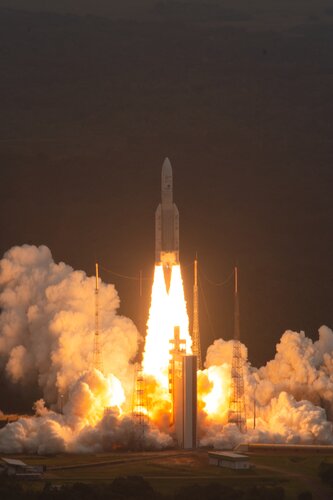
After a successful launch of the NASA/ESA/CSA James Webb Space Telescope on 25 December, and completion of two mid-course correction manoeuvres, the Webb team has analysed its initial trajectory and determined the observatory should have enough propellant to allow support of science operations in orbit for significantly more than a 10-year lifetime (the minimum baseline for the mission is five years).
With its single 'eye,' NASA's DART returns first images from space

Just two weeks after launching from Vandenberg Space Force Base in California, NASA's Double Asteroid Redirection Test (DART) spacecraft has opened its "eye" and returned its first images from space—a major operational milestone for the spacecraft and DART team.
After the violent vibrations of launch and the extreme temperature shift to minus 80 degrees C in space, scientists and engineers at the mission operations center at the Johns Hopkins Applied Physics Laboratory in Laurel, Maryland, held their breath in anticipation. Because components of the spacecraft's telescopic instrument are sensitive to movements as small as 5 millionths of a meter, even a tiny shift of something in the instrument could be very serious.
An icy spring at the Martian South Pole
 In addition to its enormous volcanoes, huge rift valley systems, and dried-up crater lakes and river valleys, the ice caps at the north and south poles of Mars have been the subject of intensive scientific investigations. These ice caps, which grow in the winter and shrink in the spring and summer, are also a distinctly aesthetic sight. This image, created using data acquired by the German Aeros
In addition to its enormous volcanoes, huge rift valley systems, and dried-up crater lakes and river valleys, the ice caps at the north and south poles of Mars have been the subject of intensive scientific investigations. These ice caps, which grow in the winter and shrink in the spring and summer, are also a distinctly aesthetic sight. This image, created using data acquired by the German Aeros AFRL, Northrop Grumman demonstrate solar to radio frequency conversion
 The Air Force Research Laboratory's and Northrop Grumman's Space Solar Power Incremental Demonstrations and Research (SSPIDR) Project have successfully conducted the first end-to-end demonstration of key hardware for the Arachne flight experiment.
A ground demonstration of novel components for the "sandwich tile" were used to successfully convert solar energy to radio frequency (RF) - a fu
The Air Force Research Laboratory's and Northrop Grumman's Space Solar Power Incremental Demonstrations and Research (SSPIDR) Project have successfully conducted the first end-to-end demonstration of key hardware for the Arachne flight experiment.
A ground demonstration of novel components for the "sandwich tile" were used to successfully convert solar energy to radio frequency (RF) - a fu NASA's Webb Telescope Keeping Cool with Ultra-thin DuPont Kapton Polyimide Films
 After 30 years in development, the National Aeronautics Space Administration's (NASA) James Webb Space Telescope (JWST) was launched on December 25, 2021, from the European Space Agency's launch site at Kourou in French Guiana. DuPont technology, in the form of ultra-thin Kapton polyimide films, is the crucial material protecting the JWST from the light and the heat of the sun, enabling it to fu
After 30 years in development, the National Aeronautics Space Administration's (NASA) James Webb Space Telescope (JWST) was launched on December 25, 2021, from the European Space Agency's launch site at Kourou in French Guiana. DuPont technology, in the form of ultra-thin Kapton polyimide films, is the crucial material protecting the JWST from the light and the heat of the sun, enabling it to fu Perseverance Samples in Review: 2021
 As the 2021 calendar year comes to a close, it's nice to sit back and reflect on all the progress we've made on Mars this year. It's been a busy ~300 sols for both Perseverance and our helicopter sidekick, Ingenuity!
One of Perseverance's mission objectives is to collect and store samples of the martian surface for eventual return back to Earth as part of the Mars Sample Return campaign. T
As the 2021 calendar year comes to a close, it's nice to sit back and reflect on all the progress we've made on Mars this year. It's been a busy ~300 sols for both Perseverance and our helicopter sidekick, Ingenuity!
One of Perseverance's mission objectives is to collect and store samples of the martian surface for eventual return back to Earth as part of the Mars Sample Return campaign. T Webb Telescope Aft Sunshield Pallet Deployed
 Webb is beginning to resemble the form it will take when it is fully deployed - now that the mission operations team has successfully deployed and latched into place the observatory's forward and aft Unitized Pallet Structures.
The team began working through the deployment of the forward pallet this morning, concluding at approximately 1:21 p.m. EST. The team then moved on to the aft palle
Webb is beginning to resemble the form it will take when it is fully deployed - now that the mission operations team has successfully deployed and latched into place the observatory's forward and aft Unitized Pallet Structures.
The team began working through the deployment of the forward pallet this morning, concluding at approximately 1:21 p.m. EST. The team then moved on to the aft palle 








